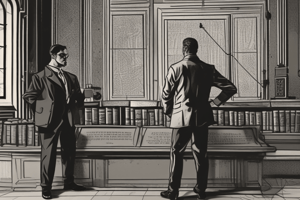Podcast
Questions and Answers
According to Musyoka, what is the primary concern of criminal law?
According to Musyoka, what is the primary concern of criminal law?
- Protecting individual rights over societal needs
- Conduct prohibited for being against societal interests (correct)
- Harmonizing relations between individuals
- Breaches of contract and trust
According to Cross and Jones, a crime must always be a tort, a breach of contract, or a breach of trust.
According to Cross and Jones, a crime must always be a tort, a breach of contract, or a breach of trust.
False (B)
According to Smith and Hogan, what makes defining a crime difficult?
According to Smith and Hogan, what makes defining a crime difficult?
Ensuring the definition enables recognition of any act (or omission) as a crime by verifying its ingredients, but this isn't always the case.
Criminal actions concern conduct against the community at large, and enforcement is not left to the victim but to the _________.
Criminal actions concern conduct against the community at large, and enforcement is not left to the victim but to the _________.
Match the following descriptions with the type of offense:
Match the following descriptions with the type of offense:
What was the key recommendation of the Wolfenden Report (1957)?
What was the key recommendation of the Wolfenden Report (1957)?
According to Lord Devlin, public morality is unimportant for the cohesion of society.
According to Lord Devlin, public morality is unimportant for the cohesion of society.
What was the House of Lords asked to confirm in the Knuller vs DPP case?
What was the House of Lords asked to confirm in the Knuller vs DPP case?
According to Lord Atkin, criminal law connotes the quality of acts or omissions prohibited under penal provisions by the authority of the _________.
According to Lord Atkin, criminal law connotes the quality of acts or omissions prohibited under penal provisions by the authority of the _________.
What is the key difference between mala in se and mala prohibita?
What is the key difference between mala in se and mala prohibita?
Common law crimes are created by legislative enactments.
Common law crimes are created by legislative enactments.
What is the primary purpose of the American Law Institute’s Model Penal Code?
What is the primary purpose of the American Law Institute’s Model Penal Code?
The origin of criminal law in Kenya is linked to _________.
The origin of criminal law in Kenya is linked to _________.
What was the significance of the East African Order in Council of 1897?
What was the significance of the East African Order in Council of 1897?
In 1930, Kenya adopted its own unique penal code, separate from the Indian Criminal Code.
In 1930, Kenya adopted its own unique penal code, separate from the Indian Criminal Code.
According to Lugard, what could result from breaking or ignoring tribal authority in British Tropical Africa?
According to Lugard, what could result from breaking or ignoring tribal authority in British Tropical Africa?
What guided native tribunals in civil and criminal cases involving Africans from 1902?
What guided native tribunals in civil and criminal cases involving Africans from 1902?
The Native Tribunal Ordinance was promulgated in _________ giving native tribunals powers to administer native law.
The Native Tribunal Ordinance was promulgated in _________ giving native tribunals powers to administer native law.
According to the Philips Report, the great majority of criminal cases dealt with by tribunals were covered by native law and customs.
According to the Philips Report, the great majority of criminal cases dealt with by tribunals were covered by native law and customs.
Until 2003, how was the Penal Code to be interpreted in Kenya?
Until 2003, how was the Penal Code to be interpreted in Kenya?
Flashcards
What is Criminal Law?
What is Criminal Law?
Area of law concerned with conduct prohibited for being against societal interests, dealing with crimes and criminal liability.
What constitutes a crime?
What constitutes a crime?
An illegal act, omission, or event that can be a tort, breach of contract/trust, prosecuted by the state, and punishable.
What is a Public Wrong?
What is a Public Wrong?
Actions that concern conduct against the community, enforced by the state, and injurious to the public as determined by judges or parliament.
Crime as a Moral Wrong
Crime as a Moral Wrong
Signup and view all the flashcards
What are felonies?
What are felonies?
Signup and view all the flashcards
What are misdemeanors?
What are misdemeanors?
Signup and view all the flashcards
What is a cognizable offence?
What is a cognizable offence?
Signup and view all the flashcards
What is a non-cognizable offence?
What is a non-cognizable offence?
Signup and view all the flashcards
What are capital offences?
What are capital offences?
Signup and view all the flashcards
Criminal Acts
Criminal Acts
Signup and view all the flashcards
Mala in se
Mala in se
Signup and view all the flashcards
Mala prohibita
Mala prohibita
Signup and view all the flashcards
Common Law Crimes
Common Law Crimes
Signup and view all the flashcards
Statutory Crimes
Statutory Crimes
Signup and view all the flashcards
Purpose of criminal law
Purpose of criminal law
Signup and view all the flashcards
Origin of Criminal Law in Kenya
Origin of Criminal Law in Kenya
Signup and view all the flashcards
Study Notes
Introduction & Nature of Criminal Law
- Criminal law is a public law area addressing conduct prohibited due to its conflict with societal interests.
- It is a body of state-made rules that harmonize relations between people and establishes criminal liability and responsibility.
- Criminal law pinpoints specific crimes and their elements and possible defenses for the accused
What is a Crime?
- Crime or offense is an illegal act, omission, or event that may also be a tort, breach of contract, or trust.
- The offender is prosecuted by the state if detected and the police decide to prosecute, and if found guilty, is punished and may be ordered to compensate the victim.
- Crime definition differs among people, lawyers, and administrators of justice consider crime an illegal act, social scientists equate crime with behaviors injurious to society, religious people link crime to sin, while others connect falsehood with crime.
- The prevalent approach defines crime as acts deviating from rules valued by the dominant segment of society.
- Identifying a crime involves checking if an act contains all definitional ingredients.
A crime is a Public Wrong
- Criminal actions involve conduct against the entire community, not just the individual.
- Enforcement is a state responsibility, with the DPP conducting criminal prosecutions in the public interest.
- Crimes are wrongs that judges or parliament deem injurious enough to warrant criminal procedure.
- Public condemnation alone does not make an act criminal without statutory enactment.
A Crime as a Moral Wrong
- Common law saw crimes as immoral acts deserving punishment.
- Early offenses were limited to outrageous and immoral acts like murder, robbery, or rape.
- The Report of the Departmental Committee on Homosexual Offences and Prostitution (Wolfenden Report- 1957) raised the issue of immorality and criminality.
- Homosexual activity between males was illegal, under the Criminal Law Amendment Act 1885
- The committee recommended that ‘homosexual behavior between consenting adults in private should no longer be a criminal offence'.
- Lord Devlin (1965) argues that public morality keeps society together and must be protected.
- Shaw vs. DPP [1962] AC 220: The House of Lords effectively created a new crime related to corrupting public morals, which Lord Reid dissented from, arguing Parliament should be the one to make the decision.
- Knuller (Publishing, Printing and Promotions) Ltd vs. DPP [1973] AC 435: The House of Lords affirmed that only Parliament can create new offenses.
Criminal Acts
- Criminal acts must be prohibited and carry a penalty.
- Lord Atkin stated that criminal law involves acts or omissions prohibited under penal provisions by state authority, discernible not by intuition but by whether the act is prohibited with penal consequences.
Classification of Crimes
- Crimes are classified in different ways.
Felonies vs. Misdemeanors
- Under section 4 of the Penal Code, a felony is an offense declared by law to be a felony or punishable without proof of previous conviction, with death, or with imprisonment for three years or more.
- A misdemeanor is an offense not classified as a felony, punishable by imprisonment of less than three years.
Cognizable vs. Non-Cognizable Offenses
- A cognizable offense, as per section 2 of the Penal Code, allows a police officer to arrest without a warrant (e.g., serious offenses like felonies).
- A non-cognizable offense requires a warrant for arrest.
Capital vs. Ordinary Offenses
- Capital offenses lack a statutory definition but involve a death sentence (e.g., treason, robbery with violence, murder), while ordinary/non-capital offenses do not involve the death penalty.
Mala in se vs. Mala Prohibita
- Mala in se crimes are inherently wrong or evil, while mala prohibita crimes are wrong because statutes prohibit them. Crimes endangering lives are generally mala in se
Common Law Crimes vs. Statutory Crimes
- Common law crimes are created by courts via judicial precedents, while statutory crimes are created by statutes through legislative enactments.
- Most crimes today are statutory, with the legislature defining and prescribing punishment; common law crimes in Kenya are incorporated into statutes via the Penal Code.
Purposes of Criminal Law
- Criminal law should not enforce morals.
- The American Law Institute's Model Penal Code's purposes of criminal law consists of preventing unjustifiable harm to individuals or public interests, controlling those disposed to commit crimes, safeguarding conduct without fault, providing fair warning of offense nature and differentiating between serious and minor offenses.
The Origin of Criminal Law in Kenya
- Kenya's criminal law originates from colonialism, with Britain introducing British law after taking over Kenya, Uganda, and parts of Zanzibar.
- Unlike Britain and Wales, Kenya adopted the Indian Penal Code.
- The general principles of criminal liability in Kenya are mainly founded on common law.
- The East African Order in Council of 1897 gave Her Majesty jurisdiction and power to make laws, establishing the Chief Native Court.
- Native tribunals were originally to be guided by African Customary Law, but later statutory law.
Studying That Suits You
Use AI to generate personalized quizzes and flashcards to suit your learning preferences.




